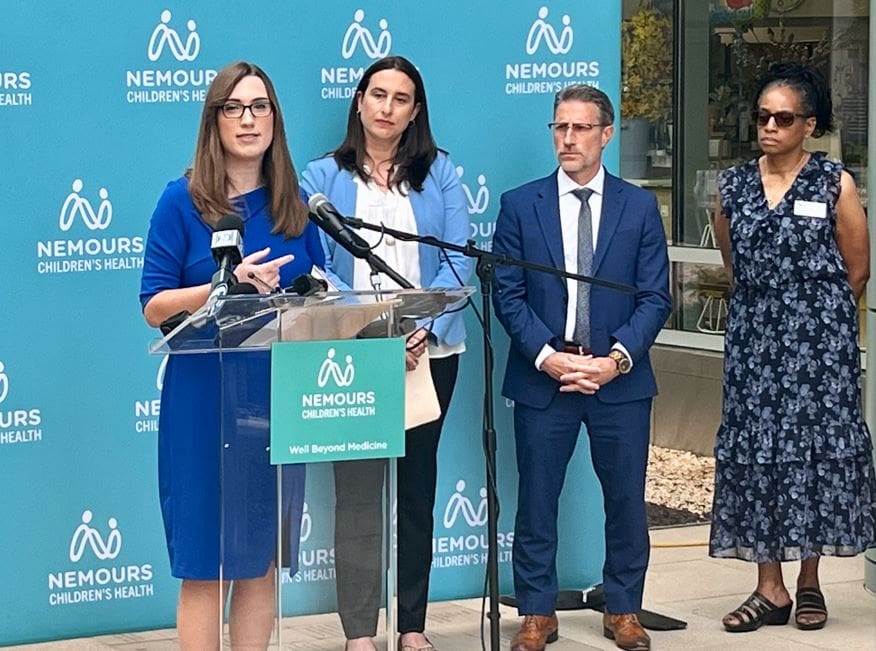

SB would ramp up the state’s efforts to eliminate lead paint exposure and lead poisoning for children. (Jarek Rutz/Delaware LIVE News)
A state senator introduced a bill Monday that would crack down on lead paint in homes, including rental apartments, to prevent lead poisoning in children.
Senate Bill 9, sponsored by Sarah McBride, D-Wilmington, would create a process for health officials to identify and remediate homes that contain exposed lead paint, which includes screening every residential rental property in Delaware.
The bill would also establish a state-funding mechanism to cover the cost of those repairs.
There is no fiscal note associated with the bill yet. Those sometimes are added after a bill clears a General Assembly committee and before it goes to the Senate or House floor.
Speakers pointed out that John Carney’s recommended budget for next fiscal year includes more money for lead testing programs.
It would add $2.9 million to expand the state’s childhood lead poisoning surveillance program and remediate them, and it would add $3.8 million for testing school water.
In a press conference at Nemours Children’s Health Delaware, McBride noted that it’s been 45 years since Congress enacted a ban on the sale of lead-based paint and 37 years since it banned lead pipes in public water systems.
“57% of Delaware’s housing stock was constructed before the ban on lead paint took effect,” she said. “Every year, roughly 500 small children here in Delaware tested positive for elevated levels of lead in their blood, most of whom live in rental properties in high poverty areas.”
Efforts were unsuccessful to reach several housing groups for comment, including the Delaware Apartment Association and several real estate companies.
Young children are the most vulnerable to lead poisoning, and when sick, the side effects are more severe in them.
Among other health concerns, lead poisoning can lead to neurological damage and developmental issues.
The Rev. Shanika Perry, a board member of Action for Delaware’s Children and the Christina School District, said that her uncle had lead poisoning when he was young and was hospitalized for three months.
She noted the symptoms of lead poisoning aren’t always obvious, and said her uncle was struggling mightily in school for years as a result of the developmental delays caused by the disease.
Her uncle was exposed through lead paint in his family’s house in Baltimore.
Several speakers said that children are often exposed even if parents paint over or remodel walls that have lead paint through dust. Even if they paint over it, the new paint might crack over time allowing the lead dust to spread throughout the household.
SB 9 would create the Delaware State Lead Paint Program in the Delaware Department of
Health and Social Services.
The program is focused on determining where children whose test results show elevated blood lead levels were most likely exposed, and undertaking state-funded remediation efforts at that location if warranted.
The legislation would require program officials to notify parents or guardians of children with elevated blood-lead levels of the test results and any remediation efforts and recommendations for medical treatment within 70 days of the test results being received by the Department of Health and Social Services.
This includes finding temporary housing for families, McBride said.
Gov. John Carney’s recommended budget for next fiscal year includes $2.9 million in proposed investments to expand the state’s childhood lead poisoning surveillance program and remediate environmental sources of lead in homes.
McBride said the public is all too familiar with the headlines of gun violence being a hazard of young people, but said lead poisoning is just as dangerous.
“One of the most serious threats to the health and welfare of children here in Delaware and across the country is so pervasive, so ordinary, and many have largely forgotten that it exists at all,” she said, “and that’s what makes it so dangerous.”
Owners of rental homes would not be allowed to increase rent for three years after their property has undergone a state-funded renovation, a mechanism intended to encourage landlords to voluntarily undertake lead paint screenings and remediation on their own.
The Delaware State Housing Authority supports the bill.
“Providing quality, affordable housing opportunities, and appropriate supportive services is the mission of Delaware State Housing Authority,” a statement from the organization said. “We strive daily to meet state and federal lead regulations in our housing sites and new housing construction. The agency’s continued participation in the Childhood Lead Poisoning Prevention Advisory Committee, which is amended by Senate Bill 9, will allow DSHA to further our mission.”
“This is funding meant to give all of our public schools in Delaware a head start with this initiative,” said Mark Holodick, Delaware’s secretary of education, who called this the filter first initiative.
“The youngest citizens of our state’s blood levels can rapidly increase between six and 12 months of age,” said Jessica Rohde, a pediatrician at Nemours Children’s Health and a member of the Childhood Lead Poisoning Advisory Committee.
She said lead levels peak in blood between 18 and 36 months of age when children are living in determinate environments.
“This is due to normal developmental behaviors, as [children] become more mobile and also explore their environment with their mouths,” she said.
There is no fiscal note associated with the bill.
SB 9 will first be heard by the Senate Health and Social Service Committee.


Raised in Doylestown, Pennsylvania, Jarek earned a B.A. in journalism and a B.A. in political science from Temple University in 2021. After running CNN’s Michael Smerconish’s YouTube channel, Jarek became a reporter for the Bucks County Herald before joining Delaware LIVE News.
Jarek can be reached by email at [email protected] or by phone at (215) 450-9982. Follow him on Twitter @jarekrutz and on LinkedIn
Share this Post







